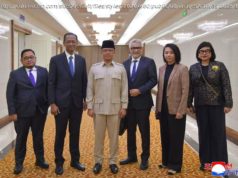UNITED NATIONS (AP) – A U. S.-drafted resolution circulated to the U. N. Security Council would add 15 North Korean individuals and four entities linked to the…
UNITED NATIONS (AP) – A U. S.-drafted resolution circulated to the U. N. Security Council would add 15 North Korean individuals and four entities linked to the country’s nuclear and missile programs to a U. N. sanctions blacklist.
The resolution would not impose any new sanctions over North Korea’s missile tests, something that China has opposed.
The final draft, obtained Thursday by The Associated Press, is expected to be put to a vote Friday afternoon, diplomats said, speaking on condition of anonymity ahead of an announcement.
The proposed resolution would impose a global travel ban and asset freeze on a range of North Koreans from the man believed to head overseas espionage operations and foreign intelligence collection to officials who control the media and key government and military appointments. The Vietnam representative of a bank and the heads of two companies would also face sanctions.
The draft would also freeze the assets of two trading companies, a bank and the Strategic Rocket Force of the Korean People’s Army, which is in charge of all ballistic missile programs.
The Security Council has already imposed six rounds of sanctions on North Korea, and the United States has been pushing for new and tougher measures. But China’s U. N. ambassador, Liu Jieyi, made clear last week that Beijing’s top priority is to restart talks with North Korea following its multiple tests to try to reduce tensions, rather than impose new sanctions.
The draft resolution doesn’t call for any new sanctions, but it would add significantly to the U. N. blacklist of individuals and entities with links to North Korea’s missile and nuclear programs. That list currently names 39 individuals and 42 entities and groups subject to sanctions.
One diplomat said all five permanent veto-wielding members – the U. S., China, Russia, Britain and France – had agreed to the proposed additions.
The first individual on the proposed new blacklist is Cho Il U, believed to be the overseas espionage and intelligence chief who is identified as the director of the Fifth Bureau of the Reconnaissance General Bureau.
Another key figure on the list is Kim Chol Nam, president of Korea Kumsan Trading Co., which procures supplies for North Korea’s atomic energy department and serves as « a cash route » to North Korea. The company would also be added to the sanctions list.
Others facing possible sanctions include:
-Kim Tong-Ho, Vietnam representative for Tanchon Commercial Bank, which is North Korea’s main « financial entity for weapons and missile-related sales. »
-Pak Han Se, vice chairman of the government committee that oversees ballistic missile production and directs activities of Korea Mining Development Corp., the country’s « premier arms dealer and main exporter of goods and equipment related to ballistic missiles and conventional weapons. »
-Ri Yong Mu, vice chairman of the State Affairs Commission, which directs and guide all military, defense and security-related affairs in the country, « including acquisitions and procurement. »
The draft resolution expresses « serious concern » that North Korea continues to violate U. N. resolutions with repeated launches and attempted launches of ballistic missiles, noting that these tests contribute to development of its nuclear weapons delivery systems.
It expresses « gravest concern » that the North’s nuclear and missile activities are generating « increased tension in the region and beyond » and continue to threaten international peace and security.
The proposed resolution would condemn North Korea’s nuclear and ballistic activities « in the strongest terms » and reaffirm the Security Council’s demand that Pyongyang abandon all nuclear weapons and programs and halt all nuclear and missile tests.
It would also reiterate the importance of maintaining peace and stability on the Korean peninsula and in northeast Asia, express the council’s commitment « to a peaceful, diplomatic and political solution to the situation, » and welcome efforts « to facilitate a peaceful and comprehensive situation through dialogue. »






